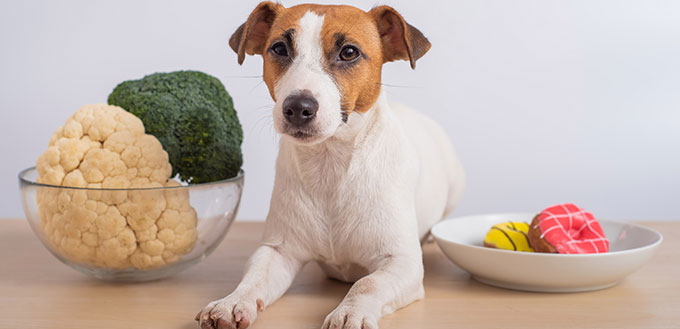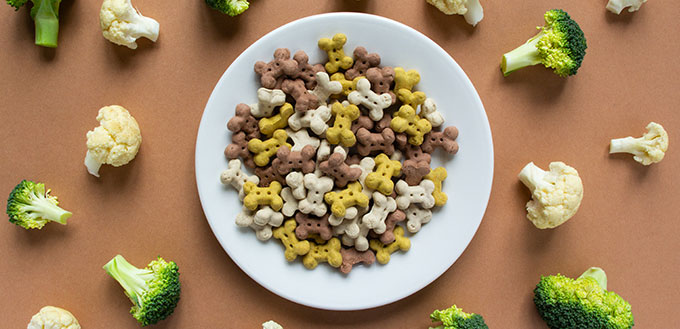So you’re making dinner and a piece of cauliflower falls out of the pan whilst you’re trying to drain it. But before you know it, your dog has gobbled it up and now you’re left wondering whether you’re going to be cleaning up a nasty mess later as a result. Many people find themselves wondering “Can dogs eat cauliflower?” Especially seeing as cauliflower and broccoli are known to give humans gas. Well, fortunately, if you feed your dog cauliflower it’s not as bad as you might think. Here’s everything you need to know about how dogs handle cauliflower and its impact on their digestive system.
Can Dogs Have Cauliflower?
In short, yes. Cauliflower is perfectly healthy for your dog to eat. If you serve cauliflower up to your dog as a tasty treat atop their usual dry dog food they will likely be thankful for the change of pace. As well as getting a variety of health benefits from the addition.
Dogs love to switch up their meals every now and again, just like humans. and the added touch of dog-friendly fruit or veg is a great way to refresh your dog’s diet. It can even be mixed in with wet food to add a bit of fresh crunch.
More and more dog owners are adding vegan alternatives to add to their dog’s daily food intake, to lessen their meat consumption where possible, and provide a healthier alternative to the usual meal toppers. And with vegetables being the cheaper option, with just as many, if not more, health benefits from eating it, it seems like the obvious choice.
Can Dogs Eat Raw Cauliflower?
They could, but we wouldn’t advise it. Raw cauliflower has a tendency to be very tough and chewy. Not only that, but it is not particularly pleasant to eat. The flavor is lacking and the texture is off. Additionally, the tough stalk can be a choking hazard for eager dogs that forget to chew properly before they swallow. Not all raw vegetables are like this, but the vast majority tend to be – with some being outright dangerous. It’s best to stick with steamed, flash-fried, roasted, or riced cauliflower for your pup.
Is Cauliflower Good For Dogs?
When dogs eat cauliflower they gain a variety of health benefits owing to the volume of vitamins and minerals in it. Not only is cauliflower a fantastic source of fiber, but it also contains vitamin C, vitamin K, calcium, folate, sulforaphane, and potassium.
- Vitamin K and calcium are both known to improve your dog’s bone density and strength, meaning they are at less risk of fractures whilst going about their highly active daily activities.
- Studies of vitamin C have shown that when a dog eats something with high levels of vitamin C, their blood antioxidant levels rise significantly, which helps to fight off bacteria and strengthen your dog’s immune system. It can also help maintain healthy skin, bone health, and help wounds to heal more easily.
- Folate is part of the vitamin B family and helps to maintain your dog’s health by assisting in the reproduction of red blood cells. As well as fortifying your dog’s body against periodontal disease and osteoporosis.
- Not only does potassium help to maintain your dog’s blood pressure, immune system, and cardiovascular health. But it also supports their bones and muscles as well as keeping their kidneys healthy and their urinary functions on track.
- Sulforaphane is also excellent for helping to keep your dog’s blood pressure even.
- Fiber is the single most important element of cauliflower for supporting your dog’s digestion and your dog’s colon health overall. When a dog consumes cauliflower (alongside feeding your dog their usual daily diet) it can help them to process their food more easily, preventing the possibility of constipation.
Is it Safe for Your Dog to Eat the Leaves and Stem?
Yes, there is no part of a cauliflower that a dog can’t eat. However, if you are wondering though it is an extremely healthy vegetable, you still need to take care to cool cauliflower thoroughly before feeding it to your dog. Where carrots can be used as a chew stick, the stems of cauliflowers are tougher for a dog to get through if they’re not cooked until soft. Therefore they present a major choking hazard.
The leaves, interestingly, are fine for your dog to eat raw or cooked, you may even find the leaves being used in some dog-friendly cauliflower recipes. Some vegetables lose a degree of nutrition when cooked and cauliflower is not unlike these other healthy veggies. However, for the sake of making it easier for your dog to get through, and removing the risk of choking, cauliflower should always be cooked through before being added to your dog’s daily diet.
When is Cauliflower Bad for Your Pooch?
Too much cauliflower added to your dog’s dry food can have an adverse effect. Where cauliflower is extremely rich in fiber, when it comes to these vegetables, dogs have a tendency to get an uncomfortable amount of gas build-up when fed too much. So whilst they can eat cauliflower, it would be advised that you stick to small quantities of these cooked veggies if you’re going to be adding them to your dog’s food on a regular basis.
Excessive gas buildup can be potentially painful for your dog and difficult for them to work through. Additionally, too much fiber can cause digestive distress such as diarrhea and an upset stomach. So just be mindful of that fact, and if you notice your dog appears to be uncomfortable after eating their meal, perhaps considering feeding your dog cauliflower less frequently. Or not at all if their reaction persists.
Other risks with cauliflower include choking on uncooked or improperly cooked stems. You should also avoid using canned vegetables, as they are often preserved in a brine that is high in salt content and can make a dog quite ill.
Finally, allergic reactions are also a risk. They can happen with anything (just like with humans). Should your dog appear to have a severe reaction to cauliflower, they may require veterinary treatment. In which case you should call your local vet for advice as soon as possible. Severe allergic reaction symptoms include; difficulty breathing, fitting, loss of consciousness, unresponsiveness.
Simple Homemade Cauliflower Dog Treat Recipes
There are several ways that you can cook cauliflower to make it into a tasty treat for your dog. Below is our favorite simple recipe for a homemade cauliflower-based dog-friendly dish for your pup to enjoy.
Cauliflower and Sweet Potato Mash
Ingredients:
- 2 x large carrots
- 2 x sweet potatoes
- 1 x cup of chopped cauliflower
- 1 x tsp turmeric powder
- 2 x tbsps virgin coconut oil
Method:
- Wash and chop all vegetables into small chunks.
- Place all vegetables into a pot of boiling water, cover the pot, and leave to cook for 15-20 minutes.
- Once finished you should be able to easily pierce the vegetables with a knife.
- Drain away all water, add the coconut oil to the pan and mash the mixture to your preferred texture (you can choose to do this in a food processor for a smooth consistency).
- sprinkle in the turmeric and thoroughly mix through.
- Place the finished mixture into small containers and freeze it until needed. To use, simply thaw out the desired amount and add it to your dog’s meal.
With something like this, you can add it to pretty much all dog foods, as the consistency can be used to coat dry foods or thicken wet foods. Some owners also like to add cooked chicken liver into the mix for extra protein, or green beans for some texture and added nutrition.
Take a look at our guide on Dog Food Containers.
Conclusion
So, can dogs eat cauliflower? The answer is yes. Your dog’s health comes first, and so it is perfectly alright to want to question everything you feed them. It’s better to be safe than sorry as they say. And happily, you now know you can let your dog eat cauliflower in all forms without any real problems. Just be mindful of your quantities and try to stick to well-cooked cauliflower for safety. But that goes for most veggies. So you can sit back and relax, knowing that if your dog gets hold of some cauliflower whilst you’re cooking, they likely won’t suffer any negative side effects from it. Unless, of course, they nab the whole thing, in which case you may be looking at a gassy night ahead.









